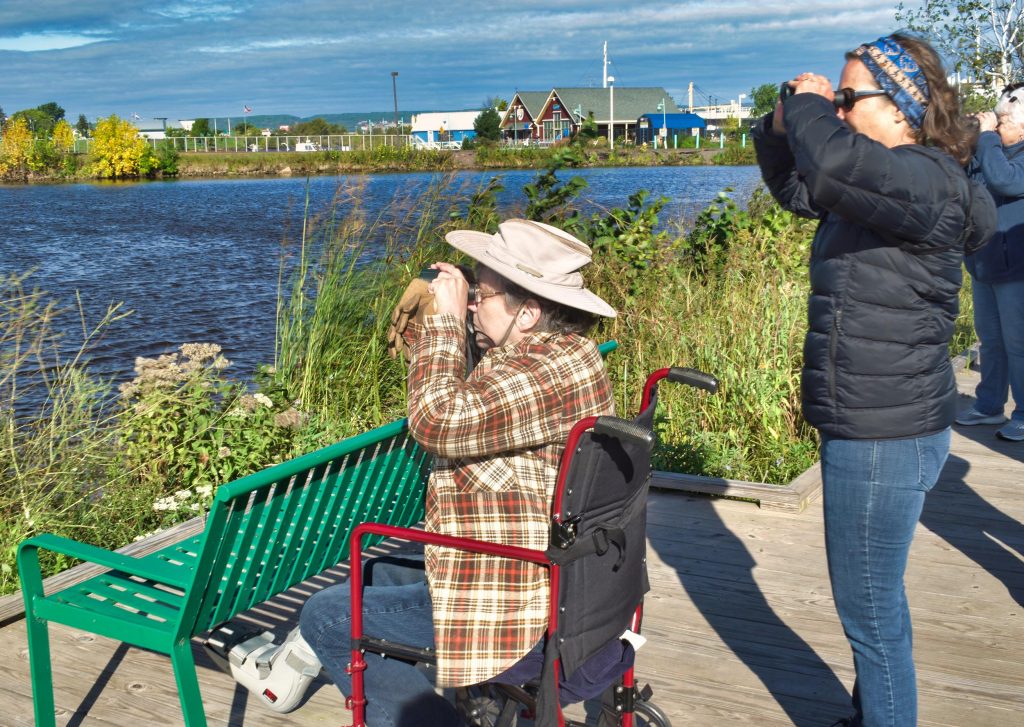
Birders look at cormorants off Barker’s Island. Image credit: Marie Zhuikov, Wisconsin Sea Grant
Students, educators, families and friends are invited to celebrate Earth Day with the kickoff of the Center for Great Lakes Literacy’s 4th Annual Great Lakes BioBlitz. This event is a great opportunity to engage youth and the public in community science, collect data to support biodiversity research and conservation, and learn more about the living things in the Great Lakes Basin.
What is the Great Lakes BioBlitz?
A free event that focuses on finding and identifying as many wild, living things as possible in the Canadian provinces and U.S. states that border the Great Lakes during a specified period of time.
When is the Great Lakes BioBlitz?
The BioBlitz begins on Earth Day (Saturday, April 22) and it runs for four weeks, ending on Saturday, May 20.
How do I participate in the Great Lakes BioBlitz?
The beauty of this project is that you decide your level of participation. Take an afternoon to explore and document some plants or wildlife in an area, or pick a location to return to weekly, or set a goal to find something new every day–there are many ways to participate. You may participate as an individual, a family, a class, or other group.
Joining is as easy as saying “One-two-three-CHEESE!”
- Visit iNaturalist or download the app onto your phone and create an account.
- Visit and become a member of the Great Lakes BioBlitz project.
- Get outside, get out your cameras, and start making and posting observations!
- To be a Bioblitz wizard, verify other participants’ Great Lakes BioBlitz Project postings.
Want to learn more about the Great Lake BioBlitz?
Visit the Great Lakes BioBlitz Resources webpage for more information about the project and educator resources for engaging youth in this wonderful learning experience.
WEBINAR! Want to learn more about a community science project that uses iNaturalist data?
Register for and attend the 2023 Great Lakes BioBlitz webinar featuring guest scientist Professor David Drake of the UW Madison, Urban Canid Project. Join us 4-5:30 p.m. CDT, April 12 on Zoom to learn about how Drake and his team are using iNaturalist to better manage urban coyotes and red foxes. It uses iNaturalist to collect the public’s sightings of coyotes and red foxes in the Madison area. His presentation will describe the type of iNaturalist data collected and how the information is used for improved urban canid management.
After registering, you will receive a confirmation email containing information on how to join the webinar. Please contact Anne Moser at akmoser@aqua.wisc.edu or (608) 262 3069 if you have any questions regarding registration, the webinar, or have accommodations and accessibility requests.
Why would we want to encourage our community to do this?
There are so many benefits of becoming a BioBlitz wizard:
- Engage in an outdoor activity, discover the wild living things in the world around you, form and strengthen a connection to your place
- Join a global community of observers, learners, and scientists passionate about biodiversity and the Great Lakes
- Contribute to a global database of organisms. Observations made on iNaturalists contribute to research, conservation, and educational outreach programs.
Time to get outside!


